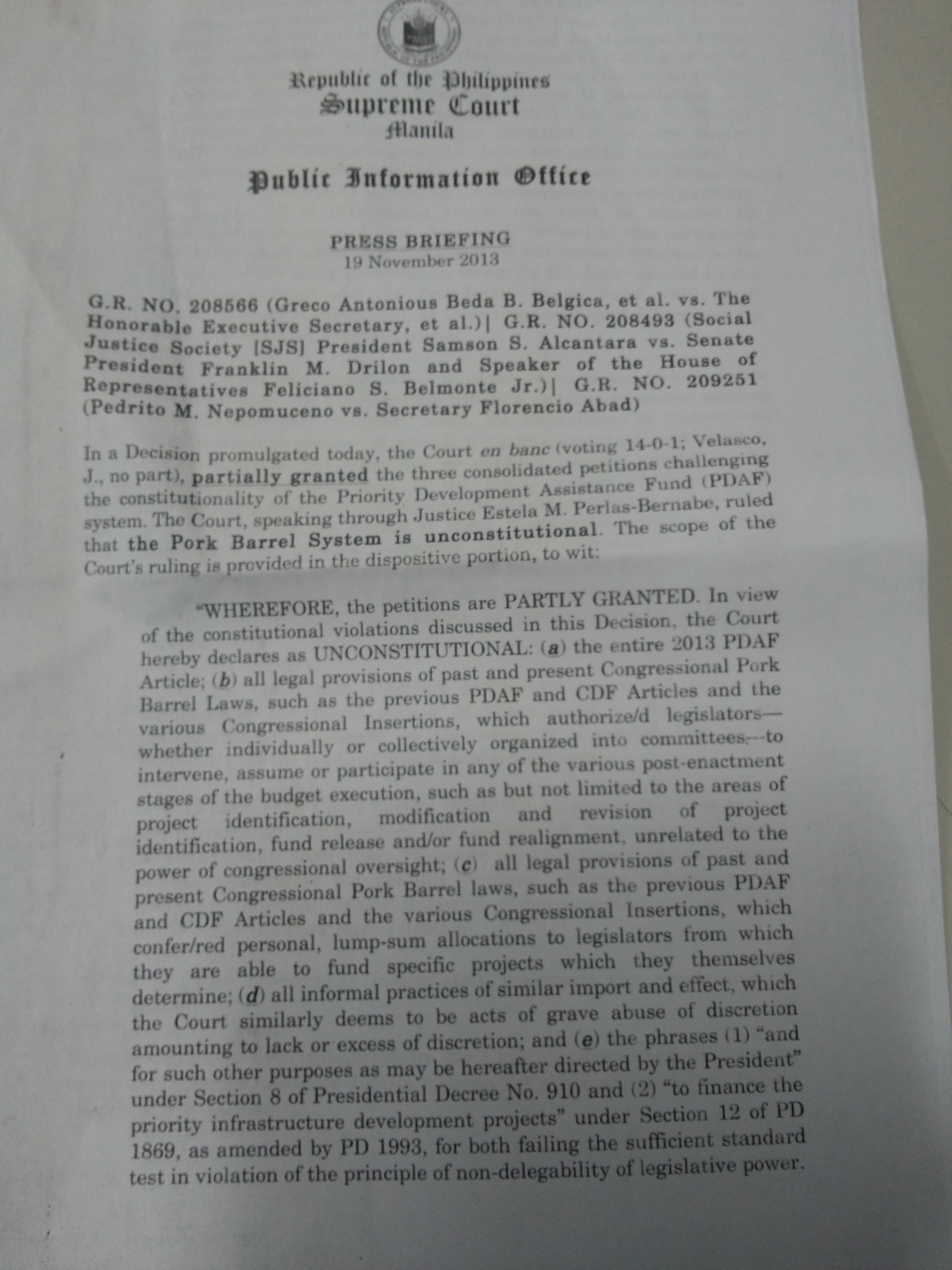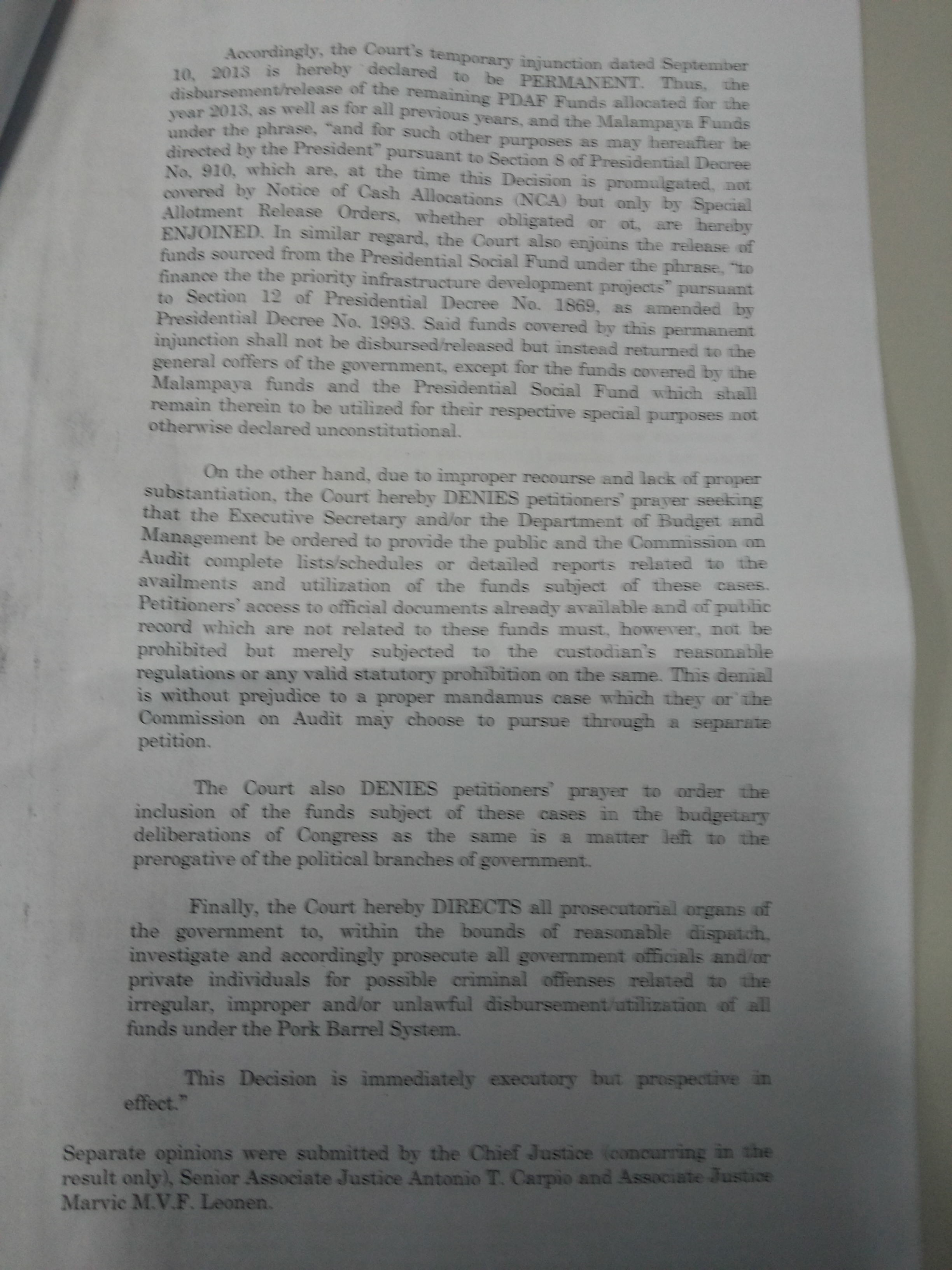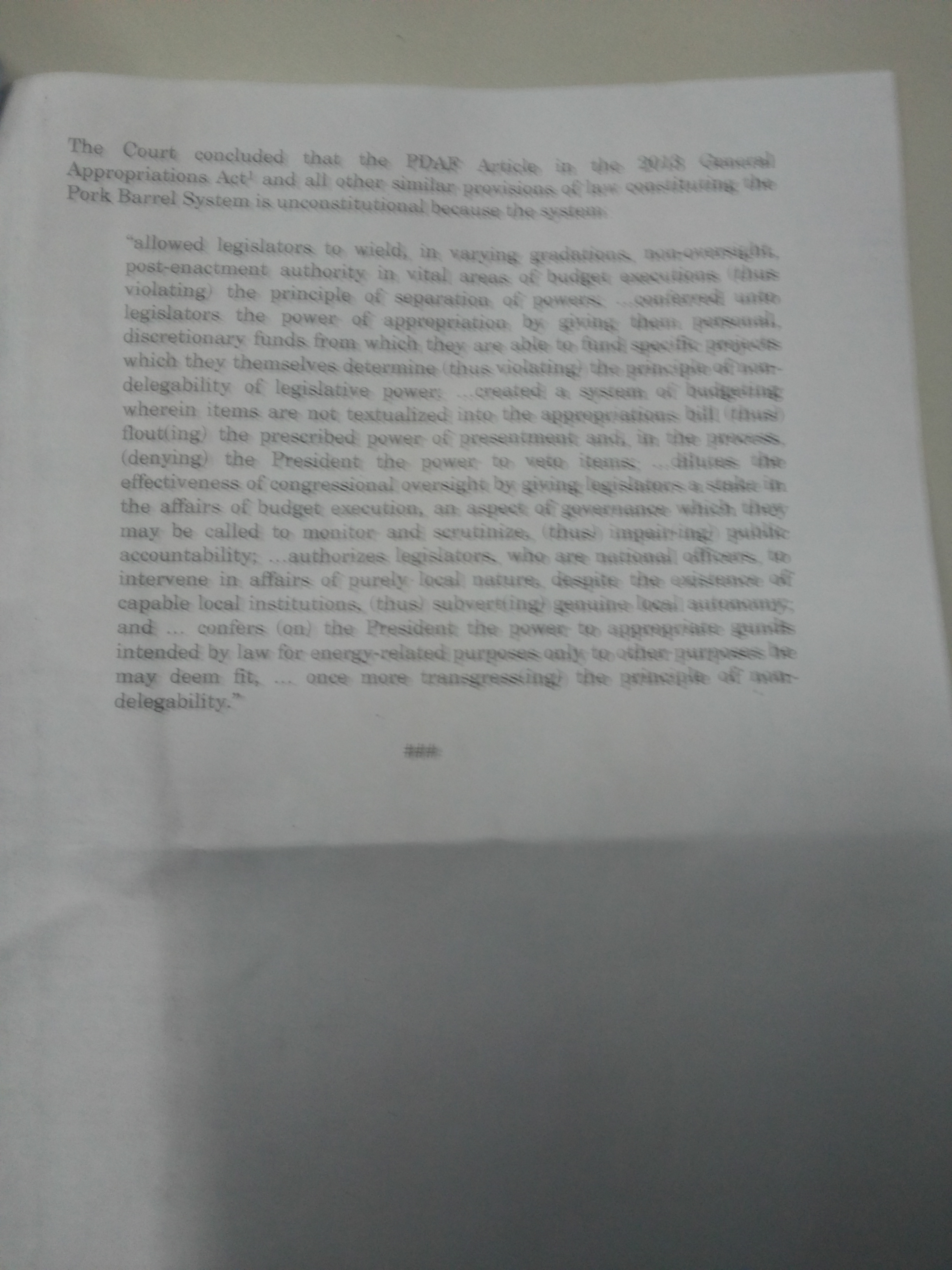MANILA, Philippines—Voting 14-0, the Supreme Court on Tuesday
declared as unconstitutional the Priority Development Assistance Fund
(PDAF) or “pork barrel.”
In the decision authored by Associate Justice Estela Perlas
Bernabe, the high court declared as unconstitutional the entire 2013
PDAF.
The high court also nullifies “all legal provisions of past and
present Congressional Pork Barrel laws, such as the previous PDAF and
Countrywide Development Fund (CDF) articles and the various
Congressional Insertions, which authorize/d legislators-whether
individually or collectively organized into committees—to intervene,
assume or participate in any of the various post-enactment stages of the
budget execution.”
At the same time, the high court also nullified the laws that
provided lawmakers lump-sum allocations to fund their chosen projects.
“All informal practices of similar import and effect, which the
Court similarly deems to be acts of grave abuse of discretion amounting
to lack or excess of discretion,” are also declared void.
“Accordingly the Court’s temporary injunction dated Sept. 10,
2013 is hereby declared to be permanent. Thus, the disbursement/release
of the remaining PDAF funds allocated for the year 2013, as well as for
all previous years…are hereby enjoined,” the high court said.
The high court ordered the Department of Justice and the Office
of the Ombudsman to investigate and file the needed cases against all
government officials as well as private individuals involved in the
improper disbursement of PDAF.
Among those who separately petitioned the court to scrap the PDAF
system are losing senatorial candidates Samson Alcantara and Greco
Belgica.
Petitioners pointed out that the system on discretionary funds of
both Congress and Malacañang violated the constitutional limits given
to the executive and the legislative because they were able to spend
money beyond what was approved by Congress “since these are lump sum
funds.”
On the other hand, the government through the Office of the
Solicitor General said the high court has upheld the constitutionality
of the PDAF system in previous cases, including LAMP vs. DBM.
Below is a copy of the Supreme Court ruling:
source: Philippine Daily Inquirer



Full copy of the Supreme Court Decision by Manila Bulletin
In view of the constitutional violations discussed in this Decision, the Court hereby declares as UNCONSTITUTIONAL: (a) the entire 2013 PDAF Article; (b)
all legal provisions of past and present Congressional Pork Barrel
Laws, such as the previous PDAF and CDF Articles and the various
Congressional Insertions, which authorize/d legislators—whether
individually or collectively organized into committees—to intervene,
assume or participate in any of the various post-enactment stages of the
budget execution, such as but not limited to the areas of project
identification, modification and revision of project identification,
fund release and/or fund realignment, unrelated to the power of
congressional oversight; (c)
all legal provisions of past and present Congressional Pork Barrel
laws, such as the previous PDAF and CDF Articles and the various
Congressional Insertions, which confer/red personal, lump-sum
allocations to legislators from which they are able to fund specific
projects which they themselves determine; (d)
all informal practices of similar import and effect, which the Court
similarly deems to be acts of grave abuse of discretion amounting to
lack or excess of discretion; and (e)
the phrases (1) “and for such other purposes as may be hereafter
directed by the President” under Section 8 of Presidential Decree No.
910 and (2) “to finance the priority infrastructure development
projects” under Section 12 of PD 1869, as amended by PD 1993, for both
failing the sufficient standard test in violation of the principle of
non-delegability of legislative power.”
“WHEREFORE, the petitions are PARTLY GRANTED. In view of the
constitutional violations discussed in this Decision, the Court hereby
declares as UNCONSTITUTIONAL: (a) the entire 2013 PDAF Article; (b)
all legal provisions of past and present Congressional Pork Barrel
Laws, such as the previous PDAF and CDF Articles and the various
Congressional Insertions, which authorize/d legislators—whether
individually or collectively organized into committees—to intervene,
assume or participate in any of the various post-enactment stages of the
budget execution, such as but not limited to the areas of project
identification, modification and revision of project identification,
fund release and/or fund realignment, unrelated to the power of
congressional oversight; (c)
all legal provisions of past and present Congressional Pork Barrel
laws, such as the previous PDAF and CDF Articles and the various
Congressional Insertions, which confer/red personal, lump-sum
allocations to legislators from which they are able to fund specific
projects which they themselves determine; (d)
all informal practices of similar import and effect, which the Court
similarly deems to be acts of grave abuse of discretion amounting to
lack or excess of discretion; and (e)
the phrases (1) “and for such other purposes as may be hereafter
directed by the President” under Section 8 of Presidential Decree No.
910 and (2) “to finance the priority infrastructure development
projects” under Section 12 of PD 1869, as amended by PD 1993, for both
failing the sufficient standard test in violation of the principle of
non-delegability of legislative power.
Accordingly, the Court’s temporary injunction dated September 10,
2013 is hereby declared to be PERMANENT. Thus, the disbursement/release
of the remaining PDAF Funds allocated for the year 2013, as well as for
all previous years, and the Malampaya Funds under the phrase, “and for
such other purposes as may hereafter be directed by the President”
pursuant to Section 8 of Presidential Decree No, 910, which are, at the
time this Decision is promulgated, not covered by Notice of Cash
Allocations (NCA) but only by Special Allotment Release Orders, whether
obligated or ot, are hereby ENJOINED. In similar regard, the Court also
enjoins the release of funds sourced from the Presidential Social Fund
under the phrase, “to finance the the priority infrastructure
development projects” pursuant to Section 12 of Presidential Decree No.
1869, as amended by Presidential Decree No. 1993. Said funds covered by
this permanent injunction shall not be disbursed/released but instead
returned to the general coffers of the government, except for the funds
covered by the Malampaya funds and the Presidential Social Fund which
shall remain therein to be utilized for their respective special
purposes not otherwise declared unconstitutional.
On the other hand, due to improper recourse and lack of proper
substantiation, the Court hereby DENIES petitioners’ prayer seeking that
the Executive Secretary and/or the Department of Budget and Management
be ordered to provide the public and the Commission on Audit complete
lists/schedules or detailed reports related to the availments and
utilization of the funds subject of these cases. Petitioners’ access to
official documents already available and of public record which are not
related to these funds must, however, not be prohibited but merely
subjected to the custodian’s reasonable regulations or any valid
statutory prohibition on the same. This denial is without prejudice to a
proper mandamus case which they or the Commission on Audit may choose
to pursue through a separate petition.
The Court also DENIES petitioners’ prayer to order the inclusion
of the funds subject of these cases in the budgetary deliberations of
Congress as the same is a matter left to the prerogative of the
political branches of government.
Finally, the Court hereby DIRECTS all prosecutorial organs of the
government to, within the bounds of reasonable dispatch, investigate
and accordingly prosecute all government officials and/or private
individuals for possible criminal offenses related to the irregular,
improper and/or unlawful disbursement/utilization of all funds under the
Pork Barrel System.
This Decision is immediately executory but prospective in effect.”
11/19/13 - SC decision restores normal constitutional order
As early as 1994, the constitutionality of the pork barrel, then
called the Countrywide Development Fund (CDF), was challenged on the
ground of violation of the rule that, although appropriating money is
the function of Congress, spending it is the prerogative of the
executive branch.
The Supreme Court ruled in favor of the CDF. It said that what
the law allowed members of Congress to do was simply to recommend
projects. If the recommended projects qualified for funding under the
CDF, it was the President who would implement them.
Prior to the approval of the 1994 General Appropriations Act
(GAA), pork barrel, which was recognized by the 1935 Constitution as a
legitimate institution, had not received much attention. In the years
from 1972 to 1986, there was no talk about pork barrel. But those were
unusual years because, for all practical purposes, President Ferdinand
Marcos controlled the national treasury, both pork and beef.
After the restoration of democratic processes and in the years
from 1986 to 1993, pork barrel was not a hot subject of debate. It was
only after the approval of the 1994 GAA that pork barrel became a
frequent front-page subject for heated discussion.
What was it in the 1994 GAA that invited debate?
Earlier pork barrel laws specifically stated that the money could
be released only with the approval of the President, and that the
budget secretary should promulgate rules and regulations for pork barrel
funds. For as long as this was followed, there was no problem.
However, such requirements were removed by the 1994 GAA, Republic Act
No. 7663.
Officials concerned
RA 7663 simply said: “The fund shall be
automatically released quarterly by way of Advice of Allotments and
Notice of Cash Allocation directly to the assigned implementing agency
not later than five (5) days after the beginning of each quarter upon
submission of the list of projects and activities by the officials
concerned.”
Who are these “officials concerned”? They
are senators, representatives, and the Vice President. In effect, RA
7663 gave to the members of Congress control over the release of
approved funds.
Whereas
under the Constitution it is the President, either directly or through
executive agencies, who should control the release of funds, the
executive agencies awaited the go-signal of the members of Congress
before they could release the funds for the projects recommended by the
members of Congress.
The decision Tuesday of the Supreme Court
restores the normal constitutional order of handling public money. The
first destination of money coming in for the public, either as taxes or
other forms of income, is the public treasury. And such money stays in
the treasury until Congress determines how it is to be used.
As the Constitution says, “No money shall
be paid out of the Treasury except in pursuance of an appropriation made
by law.” The appropriation can be either through the general
appropriations law or through special appropriations. This provision
prevents members of Congress, and the President, from indiscriminately
spending unappropriated money.
Now that we have the Supreme Court
decision, unappropriated and unspent money will have to be returned to
the general coffers of government “except for the funds covered by the
Malampaya Fund and the Presidential Social Fund, which shall remain
therein to be utilized for their respective special purposes not
otherwise declared unconstitutional.”
Effect on President
What effect will this decision have on
President Aquino’s capacity to meet emergency situations? I do not know
how much money the President has in the contingency provisions for him
in the general appropriations law.
Does he have the resources needed to deal
with the effects of the October earthquake in Bohol and now also with
the ravages caused by Supertyphoon “Yolanda?” At the rate the President
is reassuring the survivors of the ravages caused by nature, he probably
is confident that he has the resources. If needed, he can call Congress
to a special session to appropriate what more is required.
The beneficiaries of the pork barrel will probably be unhappy with the
high court’s decision. Many of them really needed what the pork barrel
system had given them. That need of many remains.
The challenge now is for Congress and for
the President to devise something constitutional to fill the vacuum left
by the Supreme Court’s decision declaring pork barrel unconstitutional.
source: Philippine Daily Inquirer's Column of
11/19/13 - Statement by Senate President Franklin M. Drilon
on the Supreme Court's ruling on the PDAF
"We welcome the decision of the Supreme
Court declaring the Priority Development Assistance Fund (PDAF)
unconstitutional. We will abide by the decision of the Supreme Court."
"The highest court's decision is moot and
academic insofar as the Senate is concerned, as the senators have
already waived their use of the remaining PDAF for 2013. Also, a
majority of the senators, at least 15 of us, have already decided to
fully delete the PDAF in the 2014 budget, which in effect will lower the
country's budget deficit pegged at P266.2 billion."
"With this decision, we are now eyeing
the passage of a supplemental budget for 2013 - and we will thereafter
urge the President to certify it as urgent - in the amount of P14.5
billion representing the unutilized PDAF for 2013, which the executive
may use to bolster its relief operations and rehabilitation of areas
affected by the recent calamities, particularly typhoon Yolanda, Santi,
Labuyo, and as well as the siege in Zamboanga City and the 7.2 magnitude
earthquake in Visayas."
"I believe the SC decision reinforces the
government's efforts to reform the country's political system and
likewise affirms the Senate's position that PDAF must be abolished."
"Everybody is stepping in the right
direction, as the abolition of PDAF system should be the start of more
reforms aimed at curbing corruption and misuse of taxpayers' money."
"With the abolition of PDAF, we will also
dismantle the system of political patronage that has stunted
socio-economic development and allowed a few to maintain their political
dominance in certain areas."
"The Senate will see to it that
henceforth, all officials shall adhere to laws and rules and regulations
governing the use of public funds."
11/15/13 - SC sets rules on DAP hearing
Lawyers for the petitioners and Malacañang will be confined to argue on
six issues when the Supreme Court holds the public hearing on the
legality of the Disbursement Acceleration Program.
In an advisory released Thursday, the SC set two categories--procedural
and substantive--the issues to be tackled on November 19.
On a technical level, the SC directed parties to resolve if there is a
controversy ripe for judicial determination, if petitioners have legal
standing to question DAP and whether certiorari, prohibition and
mandamus are proper remedies to assail the constitutionality and
validity of the DAP.
The substantive aspect covers whether or not the DAP violates Sec. 29,
Art. VI of the constitution, mandating that “no money shall be paid out
of the treasury except in pursuance of an appropriation made by law.”
The SC justices approved the guidelines in session last Tuesday.
The nine petitions against DAP were filed earlier by former Iloilo Rep.
Augusto Syjuco, lawyers Jose Malvar Villegas Jr. and Manuelito Luna;
Philippine Constitution Association; Integrated Bar of the Philippines;
the militant Bayan Muna, Kabataan and Gabriela party-list groups;
Christian sects led by losing senatorial candidate Greco Belgica;
Confederation for Unity, Recognition and Advancement of Government
Employees; and the Volunteers Against Crime and Corruption.
They alleged that the discretionary fund of the President violated the legislature’s power of the purse.
The respondents in the case--Office of the President, Department of
Budget and Management and the Senate and House of Representatives--have
asked the SC to dismiss all petitions for lack of merit.
Solicitor General Francis Jardeleza argued there was “no genuine
question of law, only error in petitioners’ appreciation of the facts”
and that critics could have just conducted “reasonable inquiry and
reading of publicly available information.”
source: Manila Standard
10/31/13: Oral arguments on DAP to focus on six issues
PARTIES to the pending petitions on the
Disbursement Acceleration Program (DAP) filed at the Supreme Court (SC)
have proposed six issues to be discussed in the impending oral arguments
on the controversial stimulus funds.
In a press briefer, the SC’s Public
Information Office (PIO) said debates will include the real nature of
the DAP, whether it is a fund or a program.
Oral arguments will also tackle the legal basis for the creation of the
DAP, its constitutionality based on fund releases upon requests of
lawmakers and the definition of “savings” under the Constitution and
other rules. Lastly, the debates will cover the DAP’s legality as a
program based on existing laws, the DAP funds’ constitutionality in
augmenting the General Appropriations Act.
The SC has allotted 30 minutes for the petitioners and respondents. The
time will not include justices’ interpellation of the speakers.
Petitioners will submit to the SC, through the assigned justice, their
proposal on how to divide the time allotment as well as the order and
identity of speakers.
Petitions challenging the DAP will be heard on oral arguments on Nov. 11 starting at 10 a.m.
“The argument will be on the merits of the petitions as well as the need to issue a stay order.”
The SC likewise ordered the solicitor general to comment on the consolidated petitions by Nov. 7.
A total of seven petitions are questioning the DAP’s constitutionality.
The latest petition was filed by losing senatorial candidate Greco
Antonious Beda B. Belgica, Bishop Reuben M. Abante and Rev. Jojo L.
Gonzales. -- Mikhail Franz E. Flores
source: Businessworld



